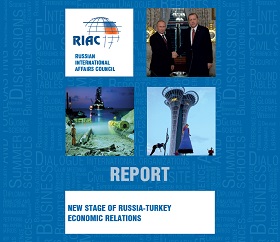On March 13, RIAC hosted a roundtable on Russia–Turkey relations. The event was opened by Hüseyin Diriöz, the Ambassador extraordinary and plenipotentiary of the Turkish Republic to Russia. RIAC editing team had a chance to ask the Ambassador about the current state and the future of relations between the two countries.
On March 13, RIAC hosted a roundtable on Russia–Turkey relations. The event was opened by Hüseyin Diriöz, the Ambassador extraordinary and plenipotentiary of the Turkish Republic to Russia. RIAC editing team had a chance to ask the Ambassador about the current state and the future of relations between the two countries.
What is your opinion on the result of the talks between Recep Tayyip Erdoğan and Vladimir Putin on March 10, 2017?
As our leaders recently confirmed during the 6 High Level Cooperation Council (HLCC), held in Moscow on March 10, 2017, the so-called “normalization process” between Turkey and the Russian Federation has finally come to an end. Now, we look forward to taking our bilateral relations beyond its previous level. To this end, 8 documents have been signed on the margins of the HLCC. These documents will further strengthen the legal foundation of our bilateral relations and accelerate cooperation on a wide range of issues including political, economic and cultural fields. On the occasion of the HLCC, Civic Forum was also convened on March, 9 bringing together opinion leaders and experts from various fields including history, press, economy and culture as a result of which a road map of activities was adopted. Civic Forum will further strengthen the already existing friendly relations between our societies.
What measures will contribute to strengthening cooperation between Turkey and Russia?
As the two leaders of both Turkey and the Russian Federation underlined during the joint press conference held in Moscow on March, 10 there is a mutual political will to bring bilateral relations to the next level.
Among others, in line with the goal set forth by President Erdoğan to reach USD 100 bn bilateral trade volume with Russia, we attach great importance to building strong economic ties. We are committed to take all necessary steps to reach this objective. I hope that we will achieve this goal with the lifting of remaining restrictions on some of the Turkish export products. I also believe that Turkish businessman will continue to be an asset for the Russian economy, once their full access to the market is granted. Meanwhile, energy is among major areas of cooperation between Turkey and Russia. In this regard, Turkish Stream Natural Gas Pipeline and Akkuyu Nuclear Power Plant projects are proceeding well. On the other hand, as President Erdoğan underlined during the joint press conference with President Putin, this year we look forward to setting a new record in our tourism cooperation. In this regard, we invite our Russian friends to Turkey to discover the rich natural, historical and cultural diversity of our country. It was also important that President Putin referred to the best feelings and memories that he personally experienced in our country. We are taking all necessary measures to ensure the safety and security of all foreign tourists, including Russians visiting Turkey.
On a different note, I am confident that strengthening bilateral ties among our countries will help contribute to the settlement of a number of regional issues such as the conflict in Syria.
How would you evaluate the cooperation on Syria between Russia and Turkey?
The conflict in Syria can be ended only through a political solution. Therefore, getting the political track resumed where it was left off a year ago has been our main priority. Thanks to our collective efforts with Russia a nationwide ceasefire finally came into effect on December 30, 2016. Turkey and the Russian Federation have become the two guarantors of the ceasefire regime and Iran followed suit. The ceasefire was an important step to help pave the way for the resumption of Geneva talks. Its violations remain a challenge. Still, Turkey, Russian Federation and Iran have reaffirmed their commitment to the consolidation and strengthening of the ceasefire regime during the talks in Astana in March 15, 2017. To this end, trilateral meetings will continue at technical and high levels in the period ahead. Astana meetings would also contribute to the Geneva process towards achieving a sustainable and genuine political transition in Syria. Meanwhile, we are also committed to expand our bilateral cooperation and coordination with the Russian Federation in the fight against terrorism.


.jpg)


